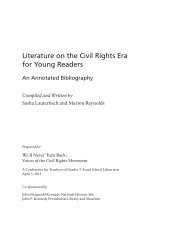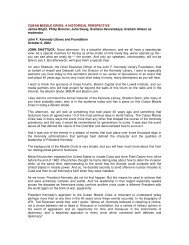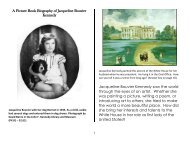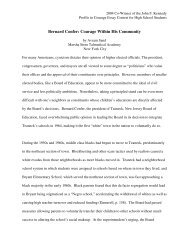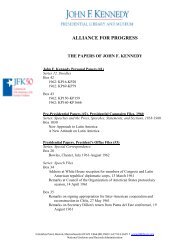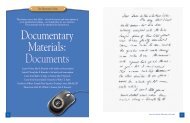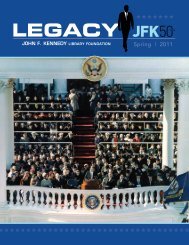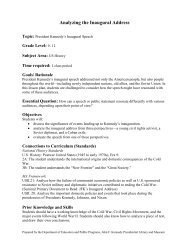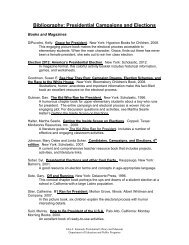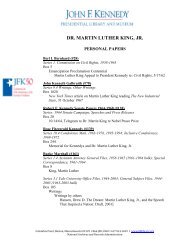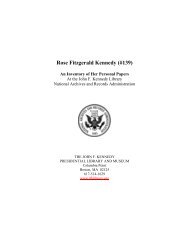- Page 1 and 2: John Kenneth Galbraith (#78) An Inv
- Page 3: Withdrawn Items Selected folders ma
- Page 7 and 8: Collection Description Series 1. Ea
- Page 9 and 10: Box 4 Files Fred Davis: 7 July 1941
- Page 11 and 12: General correspondence, 1932-1947 7
- Page 13 and 14: Undated material Reviews (6 folders
- Page 15 and 16: Boston College: Chestnut Hill, 20 F
- Page 17 and 18: Colgate University, 19 September 19
- Page 19 and 20: Box 25 July-November December 1959-
- Page 21 and 22: Miscellaneous correspondence, 1963
- Page 23 and 24: Galbraith, John Kenneth Vitae, Publ
- Page 25 and 26: July-December January 1961-June 196
- Page 27 and 28: Box 43 Box 44 Land Grant Colleges,
- Page 29 and 30: Museum of Modern Art, Lecture, 4 Au
- Page 31 and 32: Northwestern University, School of
- Page 33 and 34: January 1953-December 1954 1955: Ja
- Page 35 and 36: December 1964-4 February 1965; Unda
- Page 37 and 38: ―The Twenties: Leadership and the
- Page 39 and 40: January 1960-December 1963 1964: Ja
- Page 41 and 42: Americans for Democratic Action, 7
- Page 43 and 44: Box 78 Box 79 1972 1973 1974 Septem
- Page 45 and 46: Box 83 Box 84 British Economic Prob
- Page 47 and 48: California Democratic Council Conve
- Page 49 and 50: Box 92 Temporary Policy and Program
- Page 51 and 52: 1972 1973 1974 January-May June-Dec
- Page 53 and 54: ―Economics in the Rational Societ
- Page 55 and 56:
Foreign rights: syndicate 1970 1971
- Page 57 and 58:
1966 1968 1969 1970 January-March A
- Page 59 and 60:
Box 114 Box 115 1970 1971 1972 1973
- Page 61 and 62:
Box 119 1970: 31 May-4 June (cancel
- Page 63 and 64:
January-April May-October November-
- Page 65 and 66:
Kirkcaldy, Royal Burgh of (Scotland
- Page 67 and 68:
Box 134 Box 135 Box 136 Box 137 196
- Page 69 and 70:
―The Proper Posture of Liberalism
- Page 71 and 72:
Box 144 1971 1972 1973 1974 January
- Page 73 and 74:
1971 1972 1973 January-July August-
- Page 75 and 76:
Prince Edward Island, University of
- Page 77 and 78:
Box 159 Box 160 Box 161 Roper, Elmo
- Page 79 and 80:
Scandinavian trip, Oslo, Copenhagen
- Page 81 and 82:
Box 170 Theatre for Ideas address,
- Page 83 and 84:
1967 1968 16 September-31 October N
- Page 85 and 86:
Box 181 Whitman College lecture, Wa
- Page 87 and 88:
American Committee on East-West Acc
- Page 89 and 90:
1969-1971 ―Squire Willie‖ Revie
- Page 91 and 92:
Frank, 2002-1994 Joan 2000-1994 198
- Page 93 and 94:
For President 1971-1983 Lectureship
- Page 95 and 96:
Box 207 1980 1982 1983 1984 August
- Page 97 and 98:
1997-1996 Box 213 1995-1993 1988-19
- Page 99 and 100:
1962 1961 One Percent for Peace, Ad
- Page 101 and 102:
Runnion, Norman, 1989-1990 Rural Am
- Page 103 and 104:
JKG collected works, 1984-1978 Texa
- Page 105 and 106:
Aspen Berlin Meeting, Winter 1975 (
- Page 107 and 108:
La Le Li-Lou Low-Lu Lecture tour, 1
- Page 109 and 110:
American Committee for Iberian Free
- Page 111 and 112:
1974: 9 September-24 August 23 Augu
- Page 113 and 114:
Box 251 Wils-Wr White House Fellows
- Page 115 and 116:
1972-1969 Ea-Em En-Ez Exxon Company
- Page 117 and 118:
Mo Mug-Murp Murr-My MacNeil-Lehrer
- Page 119 and 120:
Vermont Democratic State Committee
- Page 121 and 122:
Box 265 Fundraiser for Larry DiCara
- Page 123 and 124:
McWilliams Tribute (The Nation), Ne
- Page 125 and 126:
Wadsworth Publishing Company brochu
- Page 127 and 128:
Open letter to the Federal Trade Co
- Page 129 and 130:
National Farmers-New England Box 28
- Page 131 and 132:
Auction, Boston, MA, 3 June 1979 Th
- Page 133 and 134:
Fortune Magazine, 11 August 1980 Fr
- Page 135 and 136:
Presidential campaign and election,
- Page 137 and 138:
Di-Dz Dalai Lama, Visit of, Summer
- Page 139 and 140:
Penguin Books Celebration of Guide,
- Page 141 and 142:
Cachin, Collette, New York Trip, 26
- Page 143 and 144:
Kennedy Institute of Politics Advis
- Page 145 and 146:
SUNY Geneseo, Geneseo, New York, la
- Page 147 and 148:
Coalition for Nuclear Arms Control,
- Page 149 and 150:
Kunin, Madeline Fundraiser, Cambrid
- Page 151 and 152:
Symposium on Hope for the Future, S
- Page 153 and 154:
Caja de Pensions, Barcelona, Spain,
- Page 155 and 156:
Massachusetts Freeze Voter, Lexingt
- Page 157 and 158:
Ceremonial, New York, New York, 15
- Page 159 and 160:
Galbraith, Peter and Holly wedding,
- Page 161 and 162:
Physicians for Social Responsibilit
- Page 163 and 164:
Ba-Ben Beo-Bi Bj-Bo Br Bu-Bz Beck,
- Page 165 and 166:
Luncheon Meeting, Boston, Massachus
- Page 167 and 168:
Physicians for Social Responsibilit
- Page 169 and 170:
Br-Bt Bu-Bz Box 352 Televisio de Ca
- Page 171 and 172:
Mason Fellows. 13 April 1987 Univer
- Page 173 and 174:
Box 359 Maite Piera visit, Cambridg
- Page 175 and 176:
Bull International Bankers Conferen
- Page 177 and 178:
Knowledge Products (Houghton Miffli
- Page 179 and 180:
Visit of Toni Siegrist, Stratton Fe
- Page 181 and 182:
European Association for Evolutiona
- Page 183 and 184:
Operation Dismantle, Ottawa, Ontari
- Page 185 and 186:
Brussels Conference on Eastern Euro
- Page 187 and 188:
New Congressmen Reception, Cambridg
- Page 189 and 190:
Interview with Tomasaburo Hirano of
- Page 191 and 192:
Appointment with Courtney Coile, Ca
- Page 193 and 194:
Melissa Ludtke, February 1991 Ma-Mc
- Page 195 and 196:
Trinity College, Dublin, Ireland, 2
- Page 197 and 198:
Mittu Doshi, 22 December 1992 Dutch
- Page 199 and 200:
Joan Kennedy book celebration, Bost
- Page 201 and 202:
Boston, MA, 19 December 1992 Boston
- Page 203 and 204:
Cambridge Civic Association Autumn
- Page 205 and 206:
CAG‘s trip to Morocco (aborted),
- Page 207 and 208:
New York, NY, 19 January 1994-didn
- Page 209 and 210:
Band 75th Anniversary Concert, Camb
- Page 211 and 212:
PEN Benefit Dinner, New York, NY, 1
- Page 213 and 214:
Cocktail reception, Boston, MA, 18
- Page 215 and 216:
Kennedy Institute of Politics Dinne
- Page 217 and 218:
Weld, Governor William, meeting, Ca
- Page 219 and 220:
First Person Singular Lives and Leg
- Page 221 and 222:
Old Slater Mill Founders‘ Feast:
- Page 223 and 224:
Belfer Inaugural Symposium, Cambrid
- Page 225 and 226:
Robert F. Kennedy Memorial Prize, A
- Page 227 and 228:
Canadian Women‘s Club, Weston, Ma
- Page 229 and 230:
Nieman Foundation Speech, Cambridge
- Page 231 and 232:
Hi-Ho Hu-Hy Harvard Art Museums Col
- Page 233 and 234:
Appointment with Arnold Rogow: re:
- Page 235 and 236:
Sha-Shu Shu-Sy Box 476 Sandbrook, A
- Page 237 and 238:
H Harvard Dinner for Janos Kornai,
- Page 239 and 240:
Box 488 K L Ma-McD McG-Nav McIntyre
- Page 241 and 242:
Americans for Democratic Action A A
- Page 243 and 244:
Rosenthal fund-raising party, 25-27
- Page 245 and 246:
Correspondence About Nominating Com
- Page 247 and 248:
Wheeler, George, 1972 Williams and
- Page 249 and 250:
15 May-5 November 8 December 1953-8
- Page 251 and 252:
Payroll ledger Project 205 Sub-proj
- Page 253 and 254:
1967-1968 Box 520 Economics 170 196
- Page 255 and 256:
1958-1959, correspondence, 18 Febru
- Page 257 and 258:
Harvard Law School 150 th Anniversa
- Page 259 and 260:
John Kenneth Galbraith Campaign app
- Page 261 and 262:
Gordon Weil Winchester, MA, 23 Apri
- Page 263 and 264:
―Fire Brigade Operations Abroad,
- Page 265 and 266:
Box 539 Meeting with Harriman, Call
- Page 267 and 268:
Box 541 Box 542 Editorials, 1961: 2
- Page 269 and 270:
Malayalam, 18-25 July Tamil, 19-30
- Page 271 and 272:
Box 547 Box 548 Chapter 12 Chapter
- Page 273 and 274:
Box 552 Box 553 Galley proofs Third
- Page 275 and 276:
Index Sources New Jacket Copy, Apri
- Page 277 and 278:
Box 563 Box 564 Box 565 Corrections
- Page 279 and 280:
Box 568 Box 569 Box 570 Box 571 Box
- Page 281 and 282:
Box 578 Box 579 Box 580 Itineraries
- Page 283 and 284:
Letter of invitation Voice-overs an
- Page 285 and 286:
Article in The Statesman and JKG re
- Page 287 and 288:
Box 594 Chapter 5: Settling In Chap
- Page 289 and 290:
Box 599 Page 415-517 Page 518-638 P
- Page 291 and 292:
Box 605 Typescript as edited by Hou
- Page 293 and 294:
Permissions Promotional material Pu
- Page 295 and 296:
31 August 1 September Conversations
- Page 297 and 298:
Box 626 15: ―Requiem‖ Index Com
- Page 299 and 300:
Box 632 Box 633 Box 634 [Ch. VI-XII
- Page 301 and 302:
undated [Copies] Author‘s Marked
- Page 303 and 304:
Rizzoli (Italian) Rejected from Fin
- Page 305 and 306:
Penguin edition, 1975 Andre Deutsch
- Page 307 and 308:
Jacket copy List of those receiving
- Page 309 and 310:
Reviews Second edition [Typescript]
- Page 311 and 312:
Publicity 92nd St Y, New York, 14 J
- Page 313 and 314:
Reviews Sample Chapter [Thanks for
- Page 315 and 316:
Foreign rights Notes re: Chapter 10
- Page 317 and 318:
Box 695 Box 696 Box 697 Box 698 Box
- Page 319 and 320:
Box 706 Promotion party: New York C
- Page 321 and 322:
Box 712 Box 713 Box 714 Box 715 Cha
- Page 323 and 324:
Permissions Introduction Box 721 Pu
- Page 325 and 326:
Correspondence Harvard University P
- Page 327 and 328:
Box 735 Box 736 Box 737 Box 738 Cha
- Page 329 and 330:
Box 742 Box 743 Box 744 Chapter VII
- Page 331 and 332:
Research materials Civil War Commer
- Page 333 and 334:
Box 754 Box 755 Comments November 1
- Page 335 and 336:
Box 758 Chapters I ―The Speculati
- Page 337 and 338:
British, Japanese, Italian, French,
- Page 339 and 340:
Box 771 Intermezzo I-Chapter 9 Chap
- Page 341 and 342:
Box 777 Box 778 Section 3, ―John
- Page 343 and 344:
Comments and Queries by ADW re: hea
- Page 345 and 346:
V: The Matter of Political Style VI
- Page 347 and 348:
―The Brannan Plan,‖ The Reporte
- Page 349 and 350:
1959 ―How Much Should a Country C
- Page 351 and 352:
Box 798 ―Foreign Policy: The Stuc
- Page 353 and 354:
―Berkeley in the Age of Innocence
- Page 355 and 356:
―The Decline in American Power,
- Page 357 and 358:
1976 ―The Conservative-Majority F
- Page 359 and 360:
―Seven Wonders of the Modern Worl
- Page 361 and 362:
―Fortune,‖ JKG's contributing a
- Page 363 and 364:
―The Social Consensus and the Con
- Page 365 and 366:
―Military Power and the Politics
- Page 367 and 368:
Box 838 ―Military Power, Politica
- Page 369 and 370:
Contribution to book of memoirs abo
- Page 371 and 372:
―An Evening of Child‘s Play,‖
- Page 373 and 374:
―The Sting of Truth,‖ Economic
- Page 375 and 376:
1994 1995 ―The Global Economy and
- Page 377 and 378:
2001 2002 [―Paul M. Sweezy at 90,
- Page 379 and 380:
―Some Reflections on Resource All
- Page 381 and 382:
―Countervailing Power,‖ Univers
- Page 383 and 384:
1964 ―Economics and the Quality o
- Page 385 and 386:
―Models of Economic Development,
- Page 387 and 388:
―Escape and the Answer to Violenc
- Page 389 and 390:
“Corporations in the Marketplace,
- Page 391 and 392:
1975 ―What Comes After General Mo
- Page 393 and 394:
―National and Multinational Corpo
- Page 395 and 396:
―Economic Change and Accommodatio
- Page 397 and 398:
―The Market Versus Organization i
- Page 399 and 400:
George Kistiakowsky Memorial Servic
- Page 401 and 402:
―Economics and Social Policy for
- Page 403 and 404:
1986 Three speeches given in Argent
- Page 405 and 406:
―The World Economy in 1987 and th
- Page 407 and 408:
―Economics in Perspective: Out of
- Page 409 and 410:
―The Congress: 50 Years Back, 50
- Page 411 and 412:
―Economics of Contentment: A Trac
- Page 413 and 414:
―The Present Economic Problem: Fr
- Page 415 and 416:
―Age of Pragmatism,‖ Mattner Ho
- Page 417 and 418:
Eleanor Clark Memorial tribute, Fir
- Page 419 and 420:
1999 2000 ―In the New Century,‖
- Page 421 and 422:
―A Retrospect on Monopoly,‖ [n.
- Page 423 and 424:
1977 1978 1979 The Theory of the Le
- Page 425 and 426:
Box 940 1950 1952 Lydia Pinkham is
- Page 427 and 428:
Box 941 1958 1959 1960 The Walls Ca
- Page 429 and 430:
Box 943 1968 1969 1970 1971 Report
- Page 431 and 432:
Box 946 1976 Box 947 1977 The Diary
- Page 433 and 434:
Box 951 1980 1981 1982 1983 Operati
- Page 435 and 436:
Box 954 1987 1988 Ford: The Men and
- Page 437 and 438:
By title Interviews Proceedings of
- Page 439 and 440:
Box 960 1973 1974 Espansione (Italy
- Page 441 and 442:
Box 963 1977 1978 Lawrence Film Pro
- Page 443 and 444:
1981 1982 Box 965 1983 Intermediair
- Page 445 and 446:
1987 Liberation: Paris, France, 10
- Page 447 and 448:
Box 968 Terry Philpot: ―Professor
- Page 449 and 450:
Box 970 1991 Mitchell Eisen: San Sa
- Page 451 and 452:
Box 971 Mr. and Mrs. Strober: re: K
- Page 453 and 454:
Box 972 1993 Nathan Gardels: ―Spe
- Page 455 and 456:
Box 973 ―Late Night Live‖: Aust
- Page 457 and 458:
1997 Documentary on JKG: Lives and
- Page 459 and 460:
Box 976 DoRo Film Produktion, Cambr
- Page 461 and 462:
Box 978 2000 ―Sitting out the par
- Page 463 and 464:
2003 Box 979 2004 2005 Geoff Edward
- Page 465 and 466:
Box 981 1969 1970 Wall Street Journ
- Page 467 and 468:
Box 983 1974 1975 1976 1977 Wall St
- Page 469 and 470:
1980 1981 New York Times, re: Manda
- Page 471 and 472:
[War, Taxes, & the Almighty Dollar,
- Page 473 and 474:
Box 993 H (2 folders) Heady J K (2
- Page 475 and 476:
Box 1002 Box 1003 Box 1004 [―Econ
- Page 477 and 478:
Box 1008 Testimony 1941 Box 1009 19
- Page 479 and 480:
Box 1012 1972 1973 1974 1975 1976 1
- Page 481 and 482:
Chapters 1-4 Chapters 5-7 Chapters
- Page 483 and 484:
―Conversational Fragments: War, W
- Page 485 and 486:
JKG et al discuss BBC 1 program on
- Page 487 and 488:
Ikeda visit to JKG: Soka Gakkai New
- Page 489 and 490:
―Octogenarian John Kenneth Galbra
- Page 491 and 492:
Samuelson column: Newsweek, 6 Decem
- Page 493 and 494:
Weaver, Jr.,Warren: ―Galbraith Pr
- Page 495 and 496:
Box 1027 Box 1028 Box 1029 Box 1030
- Page 497 and 498:
1995 1996 1997 1998 1999 2000 2004
- Page 499 and 500:
Handwritten notes and business card
- Page 501 and 502:
Box 1040 General correspondence, 19
- Page 503 and 504:
Harriman, Averell/Pamela 1963-1992
- Page 505 and 506:
Mexico, 1981-1982 Munich, 1988 Neth
- Page 507 and 508:
Box 1049 Box 1050 1984 1985 1986 19
- Page 509 and 510:
[Soviet Academy of Scientists and C
- Page 511 and 512:
Chapter V, The Sources of Power: Pe
- Page 513 and 514:
Hamilton/Jefferson/Gallatin Industr
- Page 515 and 516:
―Commencement Address at Albion C
- Page 517 and 518:
―Lyndon Johnson: History Reconsid
- Page 519 and 520:
[Chapter III about India] Box 1068
- Page 521 and 522:
Guido Colomba, ―L‘economista Us
- Page 523 and 524:
[Appointment Books] 1963-1964 1964-
- Page 525 and 526:
[Prime Minister of Canada with JKG,
- Page 527:
[Rhodes, Lindos] [Gstaad] [India] [



